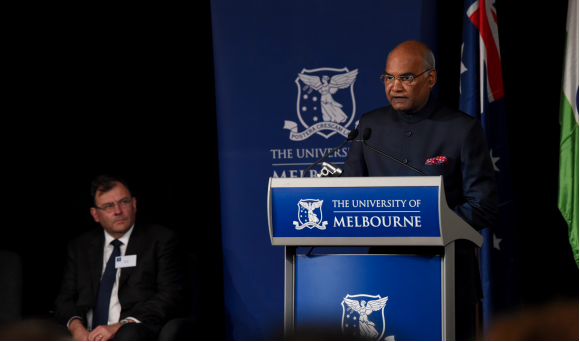Vice-Chancellor welcomes the President of India

University of Melbourne Vice-Chancellor Duncan Maskell warmly welcomed his excellency Mr Ram Nath Kovind, President of the Republic of India, to the University on Friday afternoon.
The visit was facilitated by the Australia India Institute, which is based at the University.
President Kovind was at the University to deliver a lecture titled ‘Australia and India as knowledge partners’.
Professor Maskell said it was a special occasion for the University of Melbourne to host President Kovind.
“On behalf of the University of Melbourne, I was delighted to welcome President Kovind today. It was a rare opportunity not only to meet the President, but also to listen to him discuss how knowledge and collaboration can mutually benefit Australia and India," he said.
“I look forward to continuing to strengthen and develop relations between the University of Melbourne and India, and I thank His Excellency for visiting.”
Professor Maskell said the University of Melbourne’s engagement strategy with India will continue to focus on students as well as research in the coming years.
“A large number of students from India study at the University of Melbourne. Each student is an important part of the University and they contribute to a richly diverse student population at the University of Melbourne," Professor Maskell said.
“At the same time, the University of Melbourne aims to be one of the world’s best centres for India-focused research – to build a global reputation for the quality and impact of our India research. This is something the University is passionate about achieving.”
During President’s Kovind’s visit to Australia, a Memorandum of Understanding (MoU) was signed between Australia and India to promote cooperation in the field of disability.
As a result of the MoU, a project has been approved involving the University of Melbourne and the Department of Empowerment of People with Disability in India, to co-design a course to promote community disability inclusion.
“The project will draw on the expertise of community-based rehabilitation workers in India, and the University of Melbourne’s Disability Institute and Faculty of Medicine Dentistry and Health Sciences, to develop a course to train community disability inclusion workers in India,” Professor Maskell said.